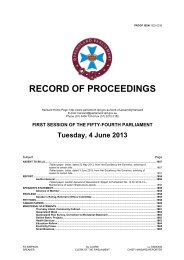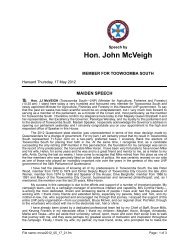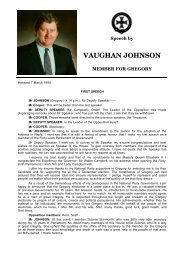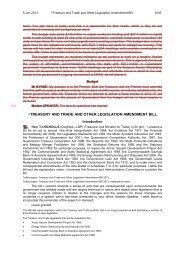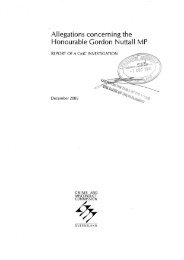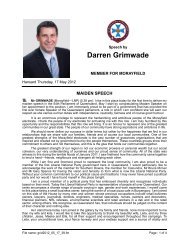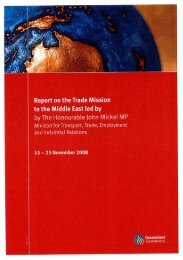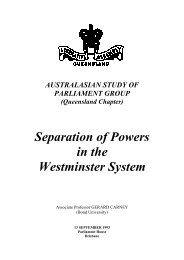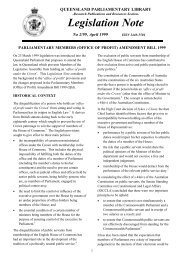weekly hansard - Queensland Parliament - Queensland Government
weekly hansard - Queensland Parliament - Queensland Government
weekly hansard - Queensland Parliament - Queensland Government
You also want an ePaper? Increase the reach of your titles
YUMPU automatically turns print PDFs into web optimized ePapers that Google loves.
23 Aug 2005 Plumbing and Drainage and Other Legislation Amendment Bill 2613<br />
Mr McNAMARA (Hervey Bay—ALP) (5.17 pm): I am delighted to rise to speak in support of the<br />
Plumbing and Drainage and Other Legislation Amendment Bill which is before the House. It is an<br />
important piece of legislation on a number of fronts. On the face of it it simply makes it possible for<br />
councils to approve grey water use for the irrigation of home gardens in sewered systems. I think all<br />
members of this House will support that.<br />
Wide Bay Water, under the leadership of Tim Waldron, the CEO, has been doing groundbreaking<br />
work and internationally renowned work in all forms of water management such as leak management<br />
and demand management. He has been trialling the use of grey water for the commercial irrigation of<br />
cane farms for a number of years with great success. I am sure that Wide Bay Water, along with the<br />
Hervey Bay City Council, will welcome the opportunity to expand this program.<br />
As members may be aware, Hervey Bay has suffered from substantial difficulties in keeping the<br />
water supply up to a very strongly growing population. We have some 50,000 people in Hervey Bay<br />
now. Some 65,000 are expected to be there within 10 years. Wide Bay Water has worked hard to try to<br />
keep the water supply up to that growing population.<br />
The minister is well aware that Wide Bay Water is in the final stages of collecting approvals for the<br />
raising of Lenthals Dam by another two metres. This is the immediate solution to the immediate<br />
problems. There are a few small approvals still outstanding with the department of natural resources<br />
and the department of environment which the minister is well aware of. I have spoken to her on a couple<br />
of occasions about tidying up those loose ends to allow us to get on with it.<br />
I want to put on the record that it is not my view that dams are the way forward in water<br />
management for growing regional and urban populations. They are perhaps the last of the old<br />
technology. If we are going to go into the future we must absolutely embrace the better use of water. We<br />
really need to embrace a paradigm shift in the way we value things in this country. For too long we have<br />
simply asked what it has cost in dollars. The cost in dollars of any economic decision is a very shallow<br />
measurement.<br />
It has been my view for a while now that everything that we do needs to be measured in terms of<br />
what it costs in water and what it costs in energy. Until we get those measurements right—until we<br />
understand that the price of something gives us no guide to the worth of something—we will continue to<br />
make some poor decisions about how we build cities and how we build roads and how we allocate the<br />
resources to build a society. The mere fact that we can pay for it in dollars does not actually mean that it<br />
is sustainable at all in the long term.<br />
I am of the view that this legislation looks simple but is extremely important, because it again says<br />
that water is very valuable, very valuable indeed—too valuable to be simply flushed away, too valuable<br />
to be lost in any way. It is one of the pieces of legislation that picks up the value of water—the real value<br />
of water. I am greatly encouraged by that. I congratulate the minister for bringing this legislation to the<br />
House. I hope that this is the start of a much longer trend in how we run our society to ask what does it<br />
cost in energy to do this? What are the alternatives that are available? What does it cost in water? What<br />
are the alternatives that are available? I commend the bill to the House.<br />
Ms MALE (Glass House—ALP) (5.20 pm): I rise this afternoon to add my support to the Plumbing<br />
and Drainage and Other Legislation Amendment Bill 2005. As we heard in this House this morning,<br />
south-east <strong>Queensland</strong> is in the grip of the second worst drought on record, and the time to act is now.<br />
We desperately need rain. Whilst we cannot control that part of the water cycle, we can put processes<br />
and plans in place to create better storage facilities, to control and reduce the water we use and to better<br />
utilise the water we have. Part of that planning must include the reuse of grey water.<br />
The primary purpose of this bill is to allow the use of grey water for watering gardens in sewered<br />
areas. Amendments to the Plumbing and Drainage Act 2002 will, for the first time, allow local<br />
governments to approve home owners using grey water to water gardens. I think this is an excellent<br />
proposal, and with the checks that will be put in place through local government compliance procedures<br />
it is a safe and effective way of utilising our precious water resources in a beneficial manner for the<br />
environment. To manage any risks to public health, grey water systems will have to use subsurface<br />
irrigation with pipes installed at least 100 millimetres below the surface. This avoids human contact with<br />
waste from laundries and showers, which can at times include traces of human waste.<br />
An important matter to note is that there will not be any storage of grey water allowed and<br />
systems can only be approved for domestic homes where grey water generated is less than 3,000 litres<br />
per day and with sufficient land to distribute the water. Whilst local governments will have the option as<br />
to whether or not they allow grey water reuse systems, I would encourage them to investigate the many<br />
benefits that the reuse of grey water can provide. Many people have asked me if the water from kitchen<br />
sinks will be allowed to be discharged, and the decision has been taken to exclude kitchen grey water<br />
due to the problems of kitchen grease clogging filters and pipes. We want a recycling system that is<br />
easy for home owners to operate and one that is not going to create a huge maintenance issue.<br />
The legislative framework for grey water use in sewered areas has the following elements: the<br />
Department of Local <strong>Government</strong> and Planning, Sport and Recreation will be responsible for approving<br />
type specifications for grey water systems; appeal against these decisions will be to the Building and



